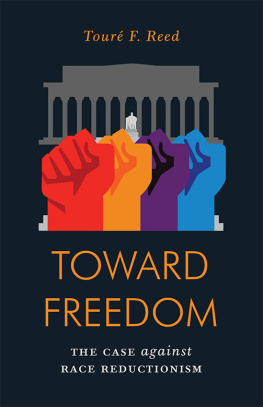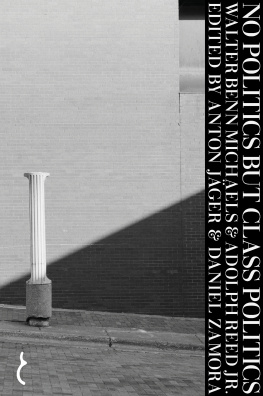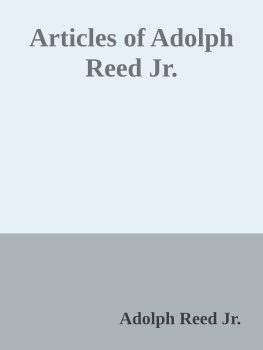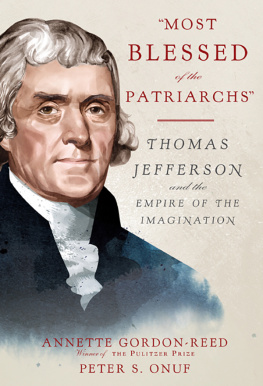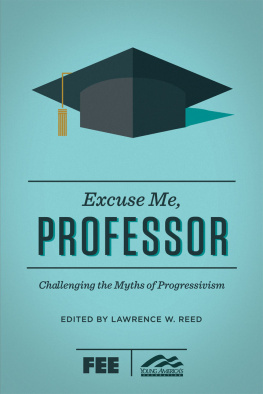Contents

Toward Freedom

The Jacobin series features short interrogations of politics, economics, and culture from a socialist perspective, as an avenue to radical political practice. The books offer critical analysis and engagement with the history and ideas of the Left in an accessible format.
The series is a collaboration between Verso Books and Jacobin magazine, which is published quarterly in print and online at jacobinmag.com.
Other titles in this series from Verso Books include:
The New Prophets of Capital by Nicole Aschoff
Four Futures by Peter Frase
Class War by Megan Erickson
Building the Commune by George Ciccariello-Maher
Peoples Republic of Walmart
by Leigh Phillips and Michal Rozworski
Red State Revolt by Eric Blanc
Capital City by Samuel Stein
Without Apology by Jenny Brown
All-American Nativism by Daniel Denvir
A Planet to Win by Kate Aronoff, Alyssa Battistoni,
Daniel Aldana Cohen, and Thea Riofrancos
Toward Freedom
The Case against Race Reductionism
TOUR F. REED

First published by Verso 2020
Tour F. Reed Verso 2020
All rights reserved
The moral rights of the author have been asserted
1 3 5 7 9 10 8 6 4 2
Verso
UK: 6 Meard Street, London W1F 0EG
US: 20 Jay Street, Suite 1010, Brooklyn, NY 11201
versobooks.com
Verso is the imprint of New Left Books
ISBN-13: 978-1-78663-438-2
ISBN-13: 978-1-78663-440-5 (US EBK)
ISBN-13: 978-1-78663-439-9 (UK EBK)
British Library Cataloguing in Publication Data
A catalogue record for this book is available from the British Library
Library of Congress Cataloging-in-Publication Data
A catalog record for this book is available from the Library of Congress
Typeset in Fournier MT by Hewer Text UK Ltd, Edinburgh
Printed in the UK by CPI Group (UK) Ltd, Croydon CR0 4YY
To my grandparents, Clarita M. Reed and
Adolph L. Reed Sr., and my father, Adolph L. Reed Jr.
CONTENTS
| ACA | Affordable Care Act |
| AFB | American Farm Bureau |
| AFDC | Aid to Families with Dependent Children |
| AFL | American Federation of Labor |
| ARA | Area Redevelopment Act |
| ARRA | American Recovery and Reinvestment Act |
| BLM | Black Lives Matter |
| BPP | Black Panther Party |
| BSCP | Brotherhood of Sleeping Car Porters |
| CAP | Community Action Program |
| CCC | Civilian Conservation Corps |
| CEA | Council of Economic Advisers |
| CETA | Comprehensive Employment and Training Act |
| CIO | Congress of Industrial Organizations |
| CORE | Congress of Racial Equality |
| CP | Communist Party |
| ED | Department of Education |
| DOL | Department of Labor |
| EAC | Emergency Advisory Councils |
| EEOC | Equal Employment Opportunity Commission |
| EFCA | Employee Free Choice Act |
| EITC | Earned Income Tax Credit |
| EPA | Environmental Protection Agency |
| FEPC | Fair Employment Practices Committee |
| FHA | Federal Housing Administration |
| FLSA | Fair Labor Standards Act |
| FRG | Federal Republic of Germany |
| HUAC | House Un-American Activities Committee |
| HUD | Housing and Urban Development (Department) |
| JCNR | Joint Committee on National Recovery |
| LDF | Legal Defense Fund of the NAACP |
| MDTA | Manpower and Development Training Act |
| MOWM | March on Washington Movement |
| NAACP | National Association for the Advancement of Colored People |
| NAFTA | North American Free Trade Agreement |
| NALC | Negro American Labor Council |
| NIRA | National Industrial Recovery Act |
| NLRA | National Labor Relations Act |
| NLRB | National Labor Relations Board |
| NNA | New Negro Alliance |
| NNC | National Negro Congress |
| NRA | National Recovery Administration |
| NUL | National Urban League |
| PWA | Public Works Administration |
| PWOC | Packinghouse Workers Organizing Committee |
| SCAD | State Commission Against Discrimination (New York) |
| SCLC | Southern Christian Leadership Conference |
| SNCC | Student Nonviolence Coordinating Committee |
| SSA | Social Security Act |
| SWOC | Steel Workers Organizing Committee |
| TARP | Troubled Asset Relief Program |
| TPP | Trans-Pacific Partnership |
| TSLU | Tobacco Stemmers and Laborers Union |
| UAW | United Auto Workers |
| VA | Veterans Administration |
| VISTA | Volunteers in Service to America |
| WB | Workers Bureau |
| WC | Workers Councils |
| WPA | Works Progress Administration/Work Projects Administration |
INTRODUCTION: THE ERA
OF RACE REDUCTIONISM
The 2016 campaign for the Democratic presidential nomination condensed around two distinct visions of social justice. One, advanced by Hillary Clinton and the partys corporate wing, accepted the limits of the neoliberal regime of upward redistribution even as it embraced fairness for nonwhites, women, gender-nonconforming people and other specified populations within the system. The other, asserted by Bernie Sanders, reaffirmed the public-good frameworkestablished during the New Deal and carried through the postwar periodthat was crucial to both the exponential growth of the American middle class and the modern civil rights movement.
Although I enthusiastically cast my ballot for Sanders in Illinoiss 2016 Democratic primary and look forward to voting for him again in 2020, when Senator Bernie Sanders announced his presidential campaign in April 2015, I feared the Democratic Party and the corporate media would succeed in their efforts to cast him as a novelty candidate. I have always appreciated Sanderss politics, but I had presumed that a quarter-century of neoliberal hegemony had crowded out space for a return to the public-good-oriented domestic agenda that he championed.
To be clear, I refer to Sanderss platform as public-good-oriented rather than democratic socialist, not because I have an aversion to socialism or dispute the candidates self-identity and long political history on the left. Rather, casting Sanders as a democratic socialist or social democrat obscures the fact that the Bernie Sanders who campaigned for the Democratic nomination ran on a platform in step with the best of New Deal liberalism.
Today, Sanderss calls for free public higher education, universal health care, tax hikes on the nations wealthiest individuals and corporations, massive reinvestment in the nations infrastructure and an invigorated union movement sound like a plan to infuse alien Scandinavian social democratic policies into American democracy. However, in the 1930s and 1940s and even in the quarter-century or so following World War IIthe era that most Americans reflexively think of as the golden age of the middle classSanderss political platform would not have been so unusual for a Democratic presidential candidate.

